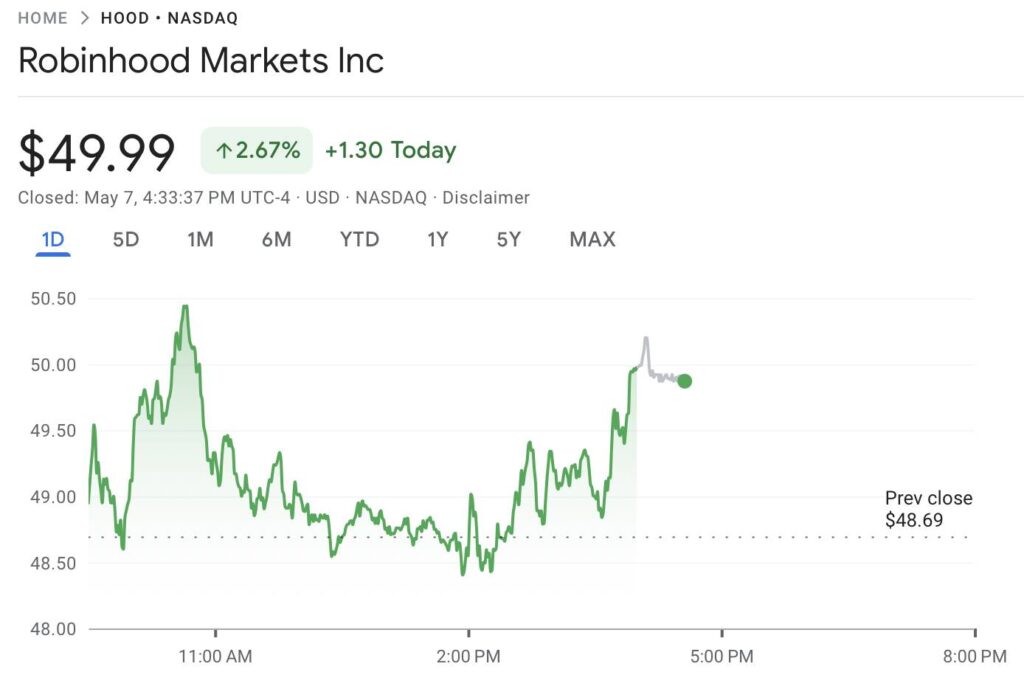In a significant move for both Robinhood and the European investment landscape, the popular brokerage firm is reportedly developing a blockchain network aimed at enabling retail investors in Europe to trade U.S. securities. According to a recent Bloomberg report, this innovative project would utilize tokenized securities, allowing investors to trade digital versions of traditional assets like stocks.
Tokenization is a growing trend in the financial sector, transforming real-world assets into digital tokens that can be traded on blockchain platforms. This approach offers several advantages, including reduced operational costs by bypassing traditional financial systems, improved accessibility for investors, and quicker settlement times for transactions. As more brokerages and investment firms recognize the benefits of asset tokenization, Robinhood is strategically positioning itself in this evolving field.
“You can sit down in front of some software, create a coin, and have it be trading in 5 minutes… that’s a scary thing,” said Robinhood CEO Vladimir Tenev, highlighting the juxtaposition between the simplicity of token creation and the complex nature of traditional IPO processes.
To support this initiative, Robinhood has engaged in discussions with two notable crypto firms, Arbitrum and the Solana Foundation, both of which are vying to become partners in this pioneering project. However, it’s important to note that no agreements have been finalized yet, and all parties involved have refrained from commenting on the specifics.
Robinhood’s expansion into Europe aligns with its recent strategic moves, including securing a brokerage license in Lithuania in April 2025, which permits the firm to offer investment services across the European Union. Furthermore, the company strengthened its crypto offering in 2024 by acquiring the well-known exchange Bitstamp. Despite a dip in revenue of 8.6% in the first quarter of 2025, Robinhood’s stock saw a boost of 2.7% on May 7, demonstrating continued investor interest in the company’s future prospects.
As the financial world increasingly turns its attention to blockchain technology, initiatives like Robinhood’s underscore the potential for transforming traditional trading environments and making investment opportunities more accessible to a broader audience. The competition in asset tokenization is heating up, with firms across the spectrum exploring innovative solutions to stay ahead in the rapidly changing landscape.
Robinhood’s Blockchain Network Development
Robinhood is making significant strides in the world of finance by planning to develop a blockchain network geared towards retail investors in Europe. Here are the key points regarding this initiative:
- Target Market Expansion:
- Robinhood aims to expand its local presence by offering trading of tokenized US securities in Europe.
- The company acquired a brokerage license in Lithuania, facilitating its entry into the European market.
- Tokenization of Securities:
- Tokenization involves converting real assets into digital tokens for trading on blockchain networks.
- Benefits include:
- Reduced costs by eliminating traditional financial infrastructure.
- Enhanced accessibility for various investors.
- Faster settlement times and quicker transaction speeds.
- Potential Partnerships:
- Crypto firms Arbitrum and the Solana Foundation are potential partners for Robinhood’s blockchain project.
- No agreements have been finalized, and both parties have declined to comment.
- Market Reactions:
- Robinhood shares saw a 2.7% increase on the Nasdaq, reflecting positive market sentiment.
- Despite a revenue decrease of 8.6% in the first quarter of 2025, the company outperformed Wall Street estimates.
- Industry Context:
- Other investment firms, including traditional finance giants like JP Morgan and Banco Santander, are exploring blockchain solutions.
- Robinhood CEO highlighted the advantages of blockchain vs. traditional IPO processes.
“You can sit down in front of some software, create a coin and have it be trading in 5 minutes […] That’s a scary thing. It’s also an incredibly powerful thing if you juxtapose it with how cumbersome the IPO process is.” – Vladimir Tenev, CEO of Robinhood
Understanding the implications of these developments is crucial for retail investors, as it may significantly change how they trade and invest in securities, offering greater flexibility and lower costs.
Robinhood’s Bold Move into Blockchain: A Game-Changer or a Risky Gamble?
The brokerage fintech Robinhood is positioning itself at the forefront of a transformative trend in finance by reportedly developing its own blockchain network that allows retail investors in Europe to trade US securities. While the shift toward tokenizing assets like stocks could reduce costs, enhance accessibility, and expedite transaction speeds, it also raises questions about the competitive landscape and potential pitfalls. This move comes amidst a backdrop of increasing interest in blockchain technology from both traditional financial institutions and the broader fintech community.
One of the key advantages of Robinhood’s blockchain initiative is its potential to democratize access to financial markets for European investors. With traditional systems often burdened by high fees and lengthy processes, Robinhood’s approach could cater to a market hungry for more efficient trading solutions. This could position them ahead of established firms that may be slower to adopt new technologies, thus attracting a younger demographic of investors who prioritize convenience and innovation.
On the downside, the competitive landscape features active participation from other fintech players, as well as established institutions like JPMorgan and Banco Santander, which are also navigating their blockchain strategies. This could lead to a saturation of the market where differentiation becomes increasingly challenging. Robinhood’s reliance on partnerships with firms like Arbitrum and the Solana Foundation could either bolster its offering or backfire if these collaborations do not yield the expected results, creating uncertainty around its blockchain strategy.
Moreover, the regulatory environment presents another layer of complexity. As Robinhood seeks to expand its footprint in Europe—having already secured a brokerage license in Lithuania—the interplay with local regulations around trading and tokenization could create hurdles, potentially hampering its growth strategy. Other fintechs that have successfully permeated the European landscape could pose significant competition or serve as barriers to entry for Robinhood.
This initiative could greatly benefit retail investors looking for a more integrated and cost-effective way to access US securities. However, it may also face challenges from traditional institutions that are ramping up their blockchain capabilities. While Robinhood’s entry into the European market is a promising development, vigilance in navigating partnerships, regulatory frameworks, and market competition will be crucial in determining the initiative’s success.















